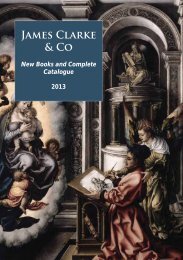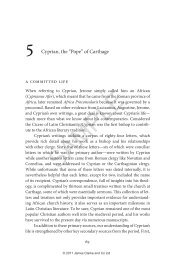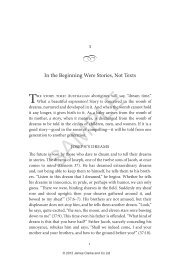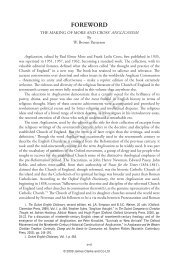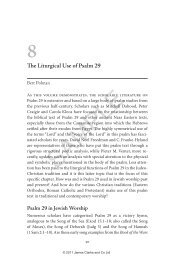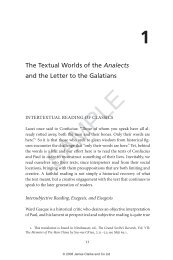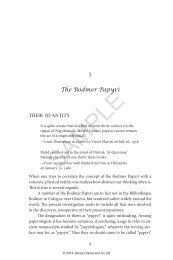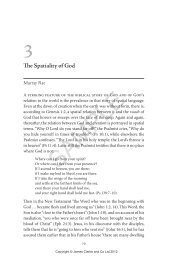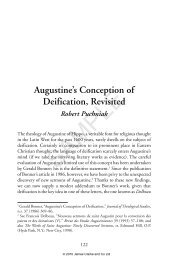Introduction by Kirk R. MacGregor - James Clarke and Co Ltd
Introduction by Kirk R. MacGregor - James Clarke and Co Ltd
Introduction by Kirk R. MacGregor - James Clarke and Co Ltd
Create successful ePaper yourself
Turn your PDF publications into a flip-book with our unique Google optimized e-Paper software.
<strong>Introduction</strong><br />
of Rome, whose thought is representative of a larger stream of early<br />
Church Fathers which has, for the last two centuries, largely been br<strong>and</strong>ed<br />
as legalistic <strong>and</strong> so foreign to the Pauline gospel. Challenging this widespread<br />
opinion as based on anachronistically viewing Clement through<br />
Reformation lenses, Withrow insists that Clement’s concept of salvation<br />
can only be understood against his first-century historical <strong>and</strong> theological<br />
backdrop. First, Withrow demonstrates that Clement was firmly<br />
entrenched in a Hellenistic Jewish tradition emphasizing moralism, as<br />
evidenced <strong>by</strong> the parallels between Clement’s prayers <strong>and</strong> Jewish liturgy<br />
<strong>and</strong> the pragmatic manner in which Clement quotes the Septuagint <strong>and</strong><br />
pseudipigraphal texts. Second, Withrow illustrates that Clement, while not<br />
a Stoic, understood Stoicism <strong>and</strong> freely appealed to Stoic ideas with which<br />
his audience would have been familiar to make Christian theological<br />
points. In sum, Clement’s religio-historical context can best be described<br />
as a Second Temple interpretive tradition embracing a diversity of Jewish<br />
texts <strong>and</strong> Greek cultural traditions while simultaneously concerned to<br />
iron out their apparent contradictions. When explaining justification to<br />
the <strong>Co</strong>rinthians, therefore, Clement works to harmonize two vital truths:<br />
genuine Christians must behave in a godly fashion <strong>and</strong> so perform good<br />
works; yet salvation is not based on these works. Due to the intersection<br />
of Clement’s belief that the <strong>Co</strong>rinthians were genuine Christians with<br />
the <strong>Co</strong>rinthians’ struggles with hubris, immorality, <strong>and</strong> schism, Clement<br />
naturally underscores the need for humility <strong>and</strong> obedience in his epistle,<br />
citing the faith <strong>and</strong> hospitality displayed <strong>by</strong> the Old Testament patriarchs.<br />
But this is not done at the expense of making salvation depend on<br />
works, for Clement insists that neither the patriarchs nor his believing<br />
contemporaries earn renown from their own righteousness, wisdom, or<br />
piety; rather, it is through faith that God has justified persons from the<br />
beginning of the world. Because divine justification is the wellspring from<br />
which good works flow, Clement goes on to assert that our good works<br />
do not ultimately belong to us but rather comprise the garments in which<br />
God adorns his children.<br />
In chapter nine I propose that the practical thrust of Calvin’s doctrine<br />
of predestination—to comfort <strong>and</strong> fortify believers in their salvation<br />
<strong>and</strong> there<strong>by</strong> empower them to live righteously—should be reclaimed <strong>by</strong><br />
the Christian tradition at large. Unfortunately, this motivation is often<br />
lost within perennial debates in evangelicalism between the theoretical<br />
consequences of Calvinism <strong>and</strong> Arminianism. In his sermons preached<br />
SAMPLE<br />
xxvii<br />
© 2011 <strong>James</strong> <strong>Clarke</strong> <strong>and</strong> <strong>Co</strong> <strong>Ltd</strong>



